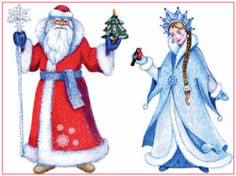
When I learnt a Russian word for frost – мороз (moróz) – this week I thought that the word for ice cream – мороженое (morózhenoe) – might come from the same root. According to Wikitionary they are related: мороженое comes from морозить (to freeze) from мороз, which comes from the Proto-Slavic *morzъ (frost).
Related words include:
– заморозок (zamorozok) = overnight freeze, cold snap (usually in late spring or early autumn, when days are warm)
– морозилка (morozilka) = freezer
– морозный (moroznyj) = frosty
Дед Мороз (Ded Moróz) is the Slavic equivalent of Father Christmas / Santa Claus. His name means “Old Man Frost” and he traditionally delivers presents to children on New Year’s Eve (31st December), and is accompanied by Снегурочка (Snegúrochka), the Snow Maiden.
I’ve never heard снегурочка stressed on the /u/. I’m going to have to listen at work to hear how the locals here pronounce it.
This whole posting of yours reminds me of why I love the book The Roots of the Russian Language so much!
Another good one:
мёрзнуть: to be cold, freeze, as in Я мёрз всю зиму “I froze all winter”
Latvian equivalent: Salavecis
sals = frost
vecis = old man (vecs = old)
I am not completely sure if Grandfather Frost is more Slavic or more Russian. In Poland, we had Święty Mikołaj = St. Nicholas (he came with presents on December 6) and Дед Мороз was (at that time at least) considered Communistic Russian creation. Even the New Year appearance of the guy was considered to be an attempt to divert attention away from Christmas. Polish translation of the Russian name was Dziadek Mróz (literally Grandfather Frost).